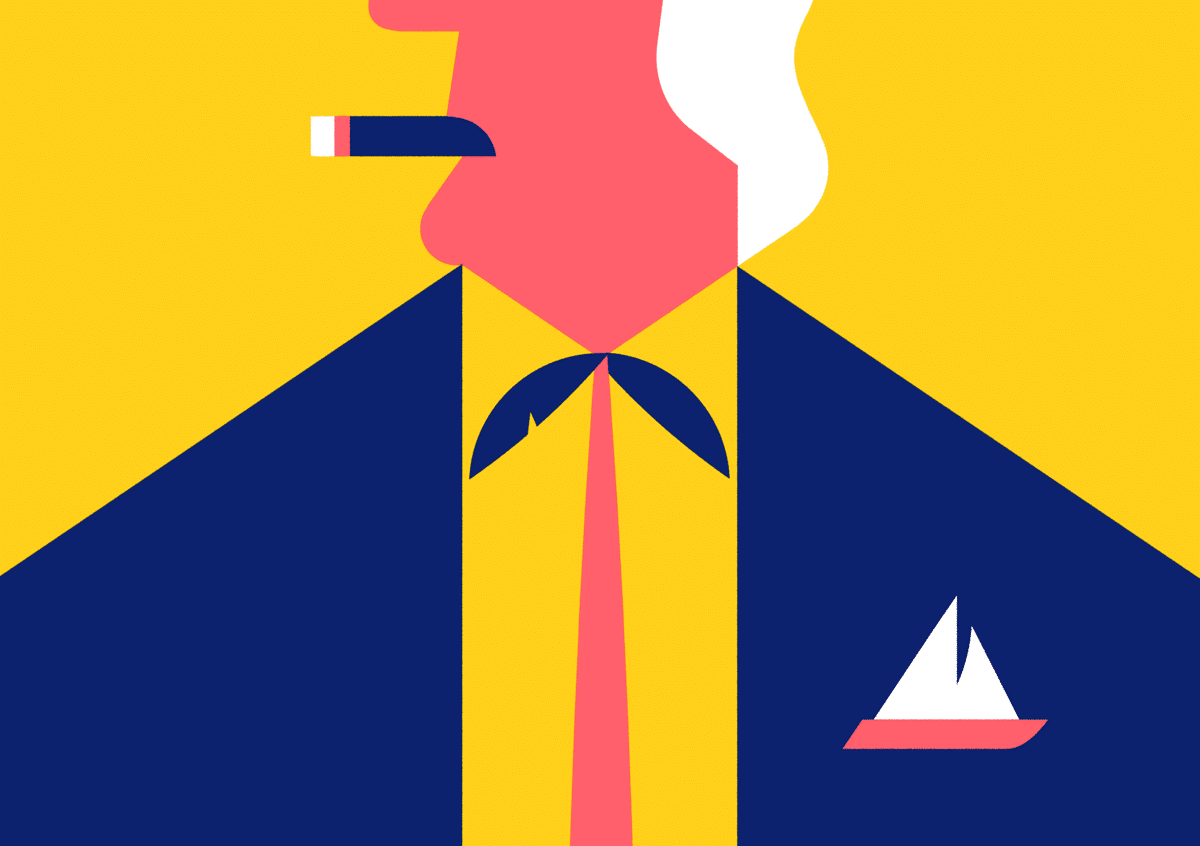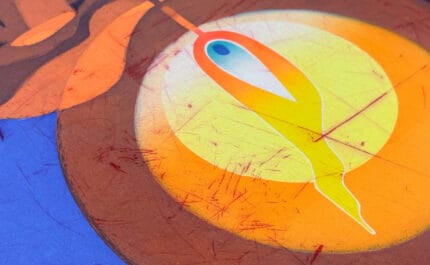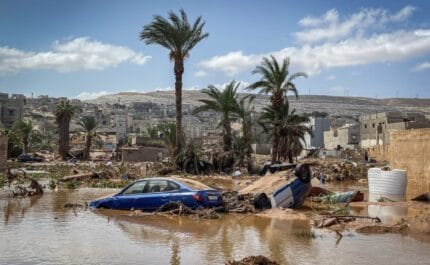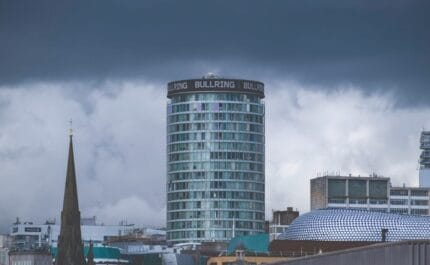The journalists who broke the Panama Papers leak walk us through their mega-scoop
In 2015, an anonymous source offered journalists Bastian Obermayer and Frederik Obermaier the Panama Papers – millions of internal documents from Panamanian law firm Mossack Fonseca that show how the world’s elite protect their money. In DG #23 the pair traced the fallout from the biggest leak in history

Illustrations by Angus Greig
3rd April 2016 (Taken from: #23)
It’s shortly after 7.30pm, Sunday 3rd April 2016. There is just under half an hour to wait until the Panama Papers are finally published – at 8pm the results of our research will be made public on the Süddeutsche Zeitung website.
Our stories for the first day of publication have been ready for a long time. All the legal checks have been carried out, all the revisions are complete and all the images prepared. The first newspapers have been printed and loaded on to the trucks on their way to our readers. Everything is ready. Only 15 minutes to go…
We are all very nervous. We have been working on this for over a year and no one knows what will happen next. How will other media institutions take up the story? How will the general population respond? Will the story fail to attract the attention it deserves, dismissed as “just another leak”?
The clocks strike 8pm. Madness breaks out. Before long, #panamapapers is the top Twitter topic, generating hundreds of thousands of tweets globally. Edward Snowden calls it the “biggest leak in the history of data journalism”. By the following day, it will be the topic of hot discussion on every continent. It’s on the front pages of newspapers in Thailand, South Korea, Canada, South America, Africa, Australia and Europe. In the US, the story dominates the front pages of The Washington Post, The Wall Street Journal, the Financial Times and The New York Times for days, even though none of these papers was involved in the collaborative project that saw 400 journalists digging through the data that had been sent to us by our anonymous source since early 2015.
Raids and searches take place in several countries… investigations are launched into the business activities of hundreds of individuals”
Within a few weeks of publication it’s clear that the story has also triggered a far more consequential response from the political sphere. Barack Obama makes a statement on the Panama Papers and declares tax evasion to be a serious and pressing problem. He follows this statement in May by announcing he is taking executive action to close loopholes used by foreigners in the US. When one of the most powerful people in the world acknowledges that politics has to do something then you have a good start, but Obama is in the last few months of his presidency so there’s a limit to what he can do. Meanwhile, the G20 countries respond with a catalogue of new measures, and the EU parliament even sets up a dedicated committee of inquiry.
Raids and searches take place in several countries. The authorities search Uefa’s offices and its marketing agency in Switzerland, and officials search the offices of Mossack Fonseca [the source of the leaked papers] in El Salvador and Peru. And, on 13th April, police raid the Mossack Fonseca headquarters in Panama.
Investigators spend 27 hours working their way through the building floor by floor, collecting what appears to be a huge volume of data. The authorities later find piles of shredded documents in another Mossack Fonseca building in Panama City. As a result of the Panama Papers, investigations are launched in several countries into the business activities of hundreds of individuals. The banking regulator in New York orders 13 banks – among them Deutsche Bank, ABN AMRO and Société Générale – to hand over all their data on business dealings with Mossack Fonseca.
Taxing questions
The Icelandic prime minister Sigmundur Gunnlaugsson’s involvement in the scandal became known three weeks before the publication of the Panama Papers as a result of a memorable interview conducted by Swedish journalists and our Icelandic colleague Jóhannes Kristjánsson. After a couple of innocuous questions, Gunnlaugsson is confronted with information that he failed to disclose his connections to an offshore company, Wintris, to parliament.
On 3rd April, Kristjánsson broadcasts the interview on television. About half the country watches the programme and it is viewed online thousands of times within just a few hours. One commentator calls it the “greatest breach of trust in the history of the Icelandic parliament”.
The following day, thousands of people gather in the square outside the Althing, Iceland’s parliament. They press against the crowd barriers, beating against them with bicycle helmets and saucepan lids. Bananas, drinks cans and rolls of toilet paper are hurled against the façade of the parliament building. More than 20,000 people march on the streets to demand their prime minister’s resignation – a huge number for a country with a population of only 330,000. Imagine 4.5 million Brits marching against David Cameron. In the end, Gunnlaugsson announces that he is temporarily handing over power. And with that he becomes the first head of government forced to resign as a consequence of the data leaked to us by our source – now known to the world as ‘John Doe’.
Our British colleagues discover Blairmore Holdings at a very early stage in their investigations. It’s an investment fund established in Panama in 1982 by Ian Cameron, the father of the British prime minister. For us, this was just one case among many. Of course it is sensational that, of all people, the father of the man keen to be seen leading the charge against tax havens set up obscure company structures in exactly those countries. But can a son be blamed for his father’s actions? We felt not. What we hadn’t considered, however, was that David Cameron himself could have profited from this very fund – or that he would choose an unfortunate communication strategy to boot.

The prime minister initially denies benefitting personally from offshore companies in the present and future tenses. But what about the past? He eventually answers this question in an interview with ITV News: “We owned 5,000 units in Blairmore Investment Trust, which we sold in January 2010.” The prime minister admits having profited from his father’s offshore fund. Thousands of protesters demand his resignation in a number of demonstrations in London.
In Pakistan Prime Minister Nawaz Sharif comes under fire after revelations about offshore companies owned by his children, and news that they held London property worth millions of pounds. [Sharif’s son Hussain Sharif has stated that all the family’s business affairs are legal.]
In Spain, minister for industry José Manuel Soria resigns after trying for days to talk his way out of his entanglement in offshore businesses [Soria has denied any wrongdoing].
And there are huge protests in Malta, after it’s revealed that two of Prime Minister Joseph Muscat’s allies – energy and health minister Konrad Mizzi and chief of staff Keith Schembri – have money in a network of companies in Panama and trusts in New Zealand. [More than a year after Obermaier and Obermayer wrote these words, on 16th October 2017, Daphne Caruana Galizia, the journalist who led much of the Panama Papers reporting in Malta, was killed by a car-bomb near her home in Bidnija, Malta. Joseph Muscat condemned her murder as “barbaric” and no one has so far claimed responsibility for the attack.]
A tropical storm
The Panama Papers also have some negative consequences for those who revealed them. The term is censored in China within a few hours of the story’s initial publication. One lawyer is arrested for sharing a comic photo montage showing the current leader of the Communist Party, Xi Jinping, and two former leaders, Deng Xiaoping and Jiang Zemin, wading through the Panama Canal. In Hong Kong, Keung Kwok-yuen, the executive chief editor of the Ming Pao newspaper, is dismissed hours after the Panama Papers revelations are made public. The official reason given was that the paper has to cut costs.
Our newspaper colleagues in Panama have to print the first issues about the Panama Papers at a secret location for fear that someone would use violence to stop their work. One of our Venezuelan colleagues is dismissed by her employer, the pro-regime newspaper Últimas Noticias. She had kept her involvement in the Panama Papers project a secret from the paper, fearing that her bosses might give the parties under investigation advance warning of the enquiry.
For the press secretary of the Russian president to respond publicly to a journalist’s questions with a demonstration of anger is not an everyday occurrence”
Of all the stories, we are most worried about the consequences that might emerge following the revelations regarding Vladimir Putin’s “best friend”, the cellist Sergei Roldugin. For reasons of safety, this is the case in which we wait longest before confronting the parties involved. After all, one of those parties is Vladimir Putin himself. It is impossible to predict how he might respond. Our Russian colleagues fear for their lives. It is the strangest feeling to send dozens of questions to Putin’s personal press secretary, Dmitry Peskov, a few days before publication – the same Peskov, incidentally, whose wife we found listed in the data as a temporary owner of an offshore company. We do not expect an answer.
On Easter Monday, Peskov appears before the Russian media and states that the Kremlin has received a “list of questions prepared in an interrogation-type manner”. These, he claims, are part of an “information attack” on the president and his family. Allegations are being made regarding a multitude of offshore companies – companies Putin knows nothing about. Peskov suspects that it is not only journalists behind this “attack”, but also “representatives of special services and other organisations”. For the press secretary of the Russian president to respond publicly to a journalist’s questions with a demonstration of anger like this is not an everyday occurrence. In fact, it has never happened before. [Putin himself would later say that the revelations about his friend Roldugin were true but did not amount to anything illegal.]
The consequences for two of our Russian colleagues are severe. Their photos are shown on Russian television, and the pair are branded as agents disseminating propaganda on behalf of the US government. Attempts are made to prevent the chief editor of Novaya Gazeta from publishing the story. He publishes the story nevertheless and now faces a tax audit – a standard reprisal in Russia.
Our Russian colleague Roman Anin writes to us a few days later: “We don’t regret anything and we’re ready to face the consequences.” We don’t know if they are safe now. If you’re an investigative reporter in Russia I guess you never really are.
Letting in the light
We had not expected much from our revelations. We hoped to attract the interest of our readers and we expected trite demands from politicians across the globe. But real change? Genuine progress in the battle against the shady world of offshore business? Not really.
“Panama is the last major holdout that continues to allow funds to be hidden offshore from tax and law enforcement authorities,” wrote Angel Gurría, secretary general of the OECD, just a few hours after our stories were first published. A few days later, Panama’s president, Juan Carlos Varela, announced that bearer shares – a key tool in tax avoidance – would be abolished. Furthermore, Panama would participate in the global exchange of tax and financial data. Ninety-seven countries and territories had already signed up to the agreement, among them the British Virgin Islands, Luxembourg, Switzerland and the Channel Islands.
However, we believe that the most effective action in the battle against tax havens would be to establish a global register revealing the true owners of shell companies. That, as former UK chancellor George Osborne eloquently put it, would be “a hammer blow against those that would illegally evade taxes and hide their wealth in the dark corners of the financial system”. The only thing we have seen used so far in the battle against tax havens is a pair of kid gloves. The debate triggered by the Panama Papers will continue for a long while yet – and it illustrates that a very different world is an achievable possibility.
There were times when we thought this was the biggest mistake of our lives. We feared we would lose everything”
Thousands of stories in more than 100 countries have been published on the Panama Papers and even we find it impossible to follow them all. We can’t even read everything our colleagues at Süddeutsche Zeitung have written. We don’t know how many more stories to expect. We have very strict libel laws in Germany. Many people think that if you get a leak it is easy going from then on – you just publish it, but the true work is behind the scenes. For every story we published we had to throw away 99 other stories, because there’s not enough material in the data.
Three months after the Panama Papers were published we have no regrets although there were times when we thought this was the biggest mistake of our lives. We feared we would lose everything. Would we be forced to leave, to flee, to take up a new name in a new city with our families? But the people in real danger were the ones writing their pieces, and using their real names in countries with repressive regimes.
If you look at Africa, an entire continent is being looted by people who don’t pay taxes to the poorest countries in the world”
This kind of economic scandal affects everybody. As soon as you explain what it means to people, then they start to care. The tax evasion issue may be boring, but the money that is lacking because people are evading taxes is real. This is why we don’t have new hospitals and new universities; it’s why we have bad roads. If you look at Africa, an entire continent is being looted by people who don’t pay taxes to the poorest countries in the world. How can you not be interested in that? It is only the one percent that is winning and we have to keep presenting this argument in an interesting way.
We can’t reveal anything on John Doe. He remains anonymous and lives with the threat of what would happen if his identity were revealed. But we can say last time we communicated there was a very happy source at the other end of the line. We are still consumed by the Panama Papers data. We are currently in a folder of 2,000 documents which includes a big name – and we’re trying to make sense of it. We are a long way from the bottom yet.
Obermayer and Obermaier’s book, The Panama Papers: Breaking the Story of How the Rich & Powerful Hide Their Money, is available for purchase now, published by Oneworld Publications.
Slow Journalism in your inbox, plus infographics, offers and more: sign up for the free DG newsletter. Sign me up
Thanks for signing up.








